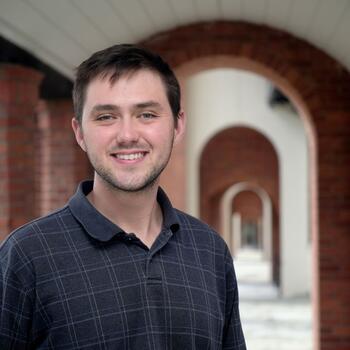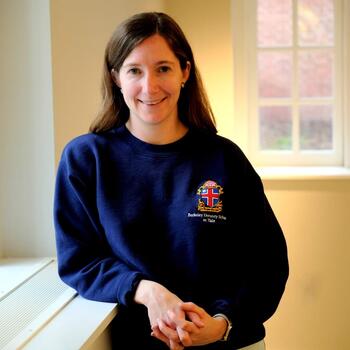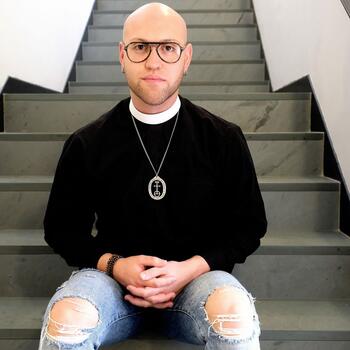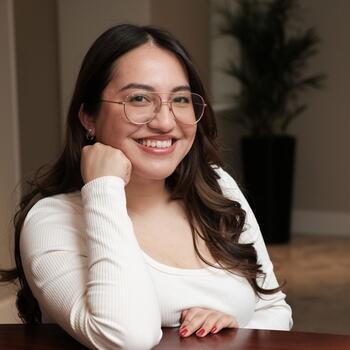Here are brief profiles of some of this year’s graduates.
- Taeha An ‘24 M.A.R.
- Sean Baz-Garza ‘24 M.Div.
- Caroline Blosser ‘24 M.Div.
- Nailah Garard ‘24 M.A.R., M.E.M.
- Lauren Hoaglund ‘24 M.A.R.
- Vincent Wei-Cheng Lin ‘24 S.T.M.
- Jamal Davis Neal Jr. ‘24 M.Div
- Jon Ort ‘24 M.Div.
- Edwin Perez ‘24 M.Div.
- Henri Santelman ‘24 M.A.R
- Dafne Villanueva ‘24 M.A.R.
Taeha An ‘24 M.A.R.
 When Taeha An was about 13, his family left Korea for Pakistan for his father’s job. While there Taeha learned English and Urdu and witnessed poverty and suffering he’d never seen before. “I encountered people who were suffering, socioeconomic minorities and religious minorities. I could sense it as a foreigner,” says Taeha. “How could I respond to the suffering of others who do not share anything in common with me? I thought studying theological or religious doctrines would help me in the process.”
When Taeha An was about 13, his family left Korea for Pakistan for his father’s job. While there Taeha learned English and Urdu and witnessed poverty and suffering he’d never seen before. “I encountered people who were suffering, socioeconomic minorities and religious minorities. I could sense it as a foreigner,” says Taeha. “How could I respond to the suffering of others who do not share anything in common with me? I thought studying theological or religious doctrines would help me in the process.”
He majored in theology and religious studies at Katholieke Universiteit Leuven in Belgium and graduates from the divinity school this spring with an M.A.R. in ethics.
His search for answers has called him to spend three months in 2023 as a volunteer at Integrated Refugee & Immigrant Services in New Haven. “I did anything and everything they asked me to do, like organizing an orientation for recently relocated refugees from Afghanistan and Syria.” He interned with the World Wildlife Fund in Pakistan and did translations for Liberty in North Korea to document conditions in North Korea. He currently serves as president of the YDS Korean student group.
“People tend to perceive Koreans as a subset of ‘the Asian race.’ However, it’s important to emphasize the uniqueness of Korean people, society, culture, and history. Emphasizing differences is often misused to justify arbitrary hierarchization or prioritization of values. But when properly articulated, it can be the starting point for conversations toward diversity and inclusion. People often forget that imposing ‘the Same,’ such as ‘the Asian race’ or ‘Asianness,’ can be violent as well. Our group is dedicated to bringing those ideas to theological communication.”
Taeha hopes to continue in academia, but his next step is the YDS Student Exchange Program at the Chinese University of Hong Kong this summer.
“It’s dedicated to urban spirituality, how different identities intersect in the urban setting in Hong Kong.” And he plans to continue his search for answers. “All my struggles deal with the suffering of others, the suffering of refugees, the suffering of North Korean defectors. My academic passions, and also my personal passions, merge together.”
—John Curtis
Sean Baz-Garza ‘24 M.Div.
 When Sean Baz-Garza was in eighth grade, his principal told him, “Sean, I think you’ll either be a preacher or a politician.” He had no plans for either at the time.
When Sean Baz-Garza was in eighth grade, his principal told him, “Sean, I think you’ll either be a preacher or a politician.” He had no plans for either at the time.
Sean grew up in a small town in central Florida in an extended family that has lived there for at least three generations. His first job in high school was taking tickets and flipping burgers at LEGOLAND. His family is Presbyterian, but Sean only started thinking seriously about religion because of his high school girlfriend.
“Going into the relationship I didn’t have many theological questions. At the end of that relationship, I had so many questions. She belonged to a church that practiced a very conservative type of Calvinism. They believed in the doctrine of double predestination, as well as the idea that terrible things that happen are consequences of divinely ordained consequences for sin.” Despite a warm relationship with her family, he says, “I couldn’t shake the feeling that I didn’t like the theology, but I didn’t have the words to use at the time.”
At nearby Florida Southern College, where his mother and grandmother also studied, he took a course in basic Christian beliefs. “It opened my eyes to the broadness of Christian tradition, to the idea that the tradition doesn’t speak in one voice on almost anything.”
His interest in theology led him to major in religion and ponder a question. “What does that mean for me? I started thinking about a call to ordained ministry early in college and joined the United Methodist Church.”
He’s on track for ordination in the UMC after spending two years as a pastoral intern at a church in New York City, participating in calls to worship, assurances of forgiveness, and prayers of confession. After graduating with an M.Div. this spring, he’ll head for Baylor University to pursue a Ph.D. in theology and ethics. “My primary interests are theological ethics. How does what we think about God make a difference for the way that we should live our lives?”
Ultimately, he’d like to be a professor and a pastor. “Post-Ph.D., if I get an academic job, great. I would really like to do both. I want to teach and preach.”
—John Curtis
Caroline Blosser ‘24 M.Div.
 After Caroline Blosser graduates in May, she’ll walk Spain’s 500-mile Camino de Santiago, since medieval times a pilgrimage to the resting place of St. James. The journey combines her interest in travel and ancient civilizations that began at Barnard College. “I love different ways to ask the big questions of who are we and what does this all mean? History is one way to do that, and I’m doing that now in divinity and that feels even more robust.”
After Caroline Blosser graduates in May, she’ll walk Spain’s 500-mile Camino de Santiago, since medieval times a pilgrimage to the resting place of St. James. The journey combines her interest in travel and ancient civilizations that began at Barnard College. “I love different ways to ask the big questions of who are we and what does this all mean? History is one way to do that, and I’m doing that now in divinity and that feels even more robust.”Nailah Garard ‘24 M.A.R., M.E.M.
 During the Great Migration, Nailah Garard’s grandmother and great-grandmother came north to Harlem. Seeing they had nowhere to stay, a local Black woman took them in. Somehow word reached home in North Carolina that they lacked enough to eat, and a crate of live chickens arrived from the family farm. “My great-grandmother plucks the feathers off the chicken and makes chicken and dumplings,” Nailah said. “That’s a hearty meal, and it’s delicious.”
During the Great Migration, Nailah Garard’s grandmother and great-grandmother came north to Harlem. Seeing they had nowhere to stay, a local Black woman took them in. Somehow word reached home in North Carolina that they lacked enough to eat, and a crate of live chickens arrived from the family farm. “My great-grandmother plucks the feathers off the chicken and makes chicken and dumplings,” Nailah said. “That’s a hearty meal, and it’s delicious.”
The story is at the heart of Nailah’s interest in eco-womanism. “I look at my grandmothers’ wisdom as knowing what to do in moments of limited resources, and of being in partnership with the food they can grow or the foods they have access to and making something out of those things.”
Nailah is graduating in May with an M.A.R. and a degree in environmental management from the School of the Environment. She’d originally gone to City College of New York to become a public interest lawyer but was dissuaded when she realized her salary would not pay off her school loans. Looking for alternatives she came upon Yale’s religion/ecology program, which matched her interests. “I had been exploring and challenging ideas of Christian fundamentalism in my upbringing and I wanted to explore that,” said Nailah, who grew up in the Church of God in Christ, where her father was a pastor.
During the pandemic she took up gardening and studied what homeland means to Black Americans. “I was writing about the histories of displacement that Black Americans have felt and a type of disassociation Black Americans have with the land.”
At Yale, Nailah has put her interests to work as manager of the Divinity Farm. The upcoming harvest includes garlic, kale, and sorrel, which are shared with the Divinity School community and beyond. “The farm is connected with the local communities around us.”
She’s still applying for jobs but hopes to work in land conservation agriculture. “I have a dream of starting a community garden at my local church, because church is a space where many families have land ownership, and that’s critically important for Black families, for Black communities that have suffered enormous land loss.”
— John Curtis (photo and story)
Lauren Hoaglund ‘24 M.A.R.
 Lauren Hoaglund remembers dressing up one Halloween as Queen Elizabeth the First, “which probably should have told you I was going to be a medieval studies major.” History is a family passion—her big sister dressed up as Helen of Troy.
Lauren Hoaglund remembers dressing up one Halloween as Queen Elizabeth the First, “which probably should have told you I was going to be a medieval studies major.” History is a family passion—her big sister dressed up as Helen of Troy.
Lauren grew up in Birmingham, Alabama, a Lutheran in a K-12 Calvinist school where she explored her faith by explaining it to her classmates. (Her senior class numbered 33 students, half of whom she knew since kindergarten.) She did indeed major in medieval and Renaissance studies at Washington & Lee, and is interested in the intersection of religion, literature, and history.
Take Shakespeare, which she taught to high school students last summer. “You can’t read The Tempest without reading secondary literature about Shakespeare’s commentary on colonialism and masters and slaves. It’s also impossible to talk about it without talking about the Reformation.”
Her studies of the early modern period cover both the Renaissance and the Reformation, marked by Martin Luther’s posting of his Ninety-Five Theses on the church door in 1517. “That’s when people start making their faith tangible in ways that I find incredibly compelling. What I’ve studied most recently is a Scottish woman who writes what can only be described as devotional poetry, but in lyric form based on her readings of Scripture.”
The poet is Elizabeth Melville, who wrote in the 1600s. Lauren’s focus is Melville’s Meditation on Psalm 42, “a beautiful and theologically rich poem.” In the Scotland of Melville’s day, psalms were put to music to sing in church. Lauren worked with the Institute of Sacred Music to have the psalm sung in four-part harmony with lute accompaniment.
After graduation, Lauren will pursue a Ph.D. in English at Duke University. Her academic pursuits, she says, are intertwined with her faith. “I’m focusing on poetry and drama in the early modern period, but I can’t do that without talking about religion, the Reformation, and theology. I think it’s impossible to read the literature of people who are truly devoted to their faith without using that as an expression of your own faith as well.”
—Photo and text by John Curtis
Vincent Wei-Cheng Lin ‘24 S.T.M.
 Vincent Lin grew up Hsinchu, Taiwan, known for its semiconductor industry and where his father taught electrical engineering. In this tech-oriented city most students went into STEM careers. “There were very few opportunities to pursue cultural or humanities activities,” Vincent says. He studied computer science at National Taiwan University.
Vincent Lin grew up Hsinchu, Taiwan, known for its semiconductor industry and where his father taught electrical engineering. In this tech-oriented city most students went into STEM careers. “There were very few opportunities to pursue cultural or humanities activities,” Vincent says. He studied computer science at National Taiwan University.
In college, he found that he was not cut out to be a computer scientist but that he loved theater. And, he says, “I felt a call to ministry.” He’d attended a nondenominational church with his family. But in college he joined Taiwan Campus Crusade for Christ, an offshoot of the United States-based Cru. “In that college fellowship setting I found that faith to be my own.”
He stayed on for 10 years with Cru as a campus minister and while there started a ministry for students in the arts, Christians and non-Christians. “We would help them find their calling as artists and provide spiritual, pastoral care.” He also started a theater company that produced plays by secular playwrights, engaging them in dialogue from a Christian worldview.
As he mentored students in theater, he asked questions. “What makes theater a worthwhile pursuit for someone with faith?” His search for answers led him to Fuller Theological Seminary to learn about art and theology. He received his M.Div. in 2022.
At YDS he’s graduating in May with an S.T.M. His thesis is on the Eucharist as immersive theater. “In conventional theater, there’s a demarcation between the audience and the performers. Immersive theater blurs the line between the performers and the audience. You’re free to roam the set, and the performers surround you and you interact with them. I’ve always been struck by how experiential and powerful that kind of engagement is.” He sees a similarity in the Eucharist. “You get up, you bow, you kneel. You walk to the altar, you eat, you drink. It makes for a very participatory experience.”
After graduation, Vincent and his wife, also a YDS student, are returning to Taiwan, where they’ll pastor a Presbyterian church. “I hope we can try to do worship that is informed by Asian traditions, but culturally relevant to young professionals in Taipei. And I hope to continue producing theater in Taiwan.”
—Photo and text by John Curtis
Jamal Davis Neal Jr. ‘24 M.Div
 In August 2022, Jamal Davis Neal Jr. (he/they) finished their social work studies at UConn as part of a joint-degree program that also includes his Yale M.Div. degree. Now, they’re seeking work at the intersection of academic affairs and student affairs, reflective of their mission to create community.
In August 2022, Jamal Davis Neal Jr. (he/they) finished their social work studies at UConn as part of a joint-degree program that also includes his Yale M.Div. degree. Now, they’re seeking work at the intersection of academic affairs and student affairs, reflective of their mission to create community.Jon Ort ‘24 M.Div.
 As a history major at Princeton, Jon Ort began research into Harvey Firestone, owner of the tire company and one of the school’s major benefactors. In 1926 Firestone created in Liberia the world’s largest rubber plantation, which relied on forced labor.
As a history major at Princeton, Jon Ort began research into Harvey Firestone, owner of the tire company and one of the school’s major benefactors. In 1926 Firestone created in Liberia the world’s largest rubber plantation, which relied on forced labor.
Covid put a pause on Jon’s research, which he completed at YDS. “It led me to realize how the Firestone company’s exploitation of Liberia profited Princeton and fueled the university’s modern rise. This is part of a much broader picture about how elite, predominantly white educational institutions, including Yale, have profited from anti-Black violence from slavery and its afterlives.”
Jon went to Princeton thinking he might continue his studies with a Ph.D. in history. “Faith has been a through line in my life,” he says, “but it hasn’t always been front and center.”
The call to faith grew stronger at Princeton during a service at the ecumenical chapel. “The welcome I received was so warm, it kept me attending services. Over time, I became a student deacon and had the chance to participate in critical conversations that my mentors were fostering.”
His mentors suggested he go to divinity school before continuing to a Ph.D. He wasn’t sure where it would lead but thought it worthwhile. “It would continue to transform me and help me to be in community and in relation with others to discern the work of justice.”
At Yale he interned at Project M.O.R.E, which helps people re-enter society after incarceration. He assessed clients’ needs, made referrals for subsidized housing, navigated Social Security and disability benefits, and helped them write resumes and apply for jobs. “That space wasn’t explicitly religious. That being said, faith was the current that suffused everything I did there.”
Jon will begin a doctoral program in history this fall and plans to study the intersection of race and religion in Liberia and across the Black Atlantic world. He’s not seeking ordination but hopes to integrate pastoral care into his work. “I aspire to be a historian, and I also aspire to be a pastoral caregiver. It doesn’t mean preaching from a pulpit. It’s not beholden to any one institutional form or any one professional pathway.”
—Photo and story by John Curtis
Edwin Perez ‘24 M.Div.
 While growing up in the Pentecostal church, Edwin Perez came to admire the role of the pastor. “I would get up on the pulpit after service and make believe that I was the pastor,” Edwin says. “Since he was a heavyset man, I would stick out my tummy. I thought that pastors had to be heavy.”
While growing up in the Pentecostal church, Edwin Perez came to admire the role of the pastor. “I would get up on the pulpit after service and make believe that I was the pastor,” Edwin says. “Since he was a heavyset man, I would stick out my tummy. I thought that pastors had to be heavy.”Henri Santelman ‘24 M.A.R.
 When Henri Santelman was six years old his family spent a week at Luther Crest Bible Camp in Minnesota. He returned each summer, eventually taking a job as a counselor. Now, in his last weeks of divinity school, he’s serving remotely as the camp’s interim program director, a job he’ll take on full-time after graduation.
When Henri Santelman was six years old his family spent a week at Luther Crest Bible Camp in Minnesota. He returned each summer, eventually taking a job as a counselor. Now, in his last weeks of divinity school, he’s serving remotely as the camp’s interim program director, a job he’ll take on full-time after graduation.
The camp, Henri says, “was formative for my faith and who I am as a person. You build so many communication skills, teamwork, leadership, independence. And it’s where I’m moving into full-time ministry work.” It’s also where he met his fiancée, who’s graduating from YDS with him, and pursued his love of music. “Starting as a camper, they encouraged me to bring my guitar and play songs around the campfire.”
Henri grew up in Alexandria, about two hours from Minneapolis. From an early age he felt a calling and was active in his Lutheran Church. He recalls the “worship wars” over whether pop and rock music belonged in religious services. “Some churches, including my home church, ended up having a traditional service and a blended service.”
He planned to major in music at Gustavus Adolphus College, but that changed during a discussion of vocations, passions, skills, and gifts in a class on Lutheran theology. “How can those things meet a need in the world and come together?” He added religious studies for a double major.
Music, he feels, has a role in worship. “I couldn’t describe why I would have a strong emotional response to singing songs like ‘Amazing Grace,’ but I did. I wanted to think about how music is being used in religious spaces. When we’re singing together in worship, that does something that connects the community.”
When he returns to Luther Crest this summer, he’ll manage a staff of 50 at a camp that hosts around 1,300 campers over the summer. He’ll recruit, hire, and train staff, and set program schedules. In the off season the camp hosts retreats and rents space for religious events.
Music, of course, will be part of the program. At YDS, he says, “I’ve found that engaging in music is one relevant way that we can reconnect people to their faith and to the church.”
—Text and photo by John Curtis
Dafne Villanueva ‘24 M.A.R.
 Dafne Villanueva grew up in Laredo, Tex., an only child raised by a single mom with help from a close and extended family who included her grandmother and two uncles. She describes herself as a “cradle Catholic” whose childhood was steeped in traditional Catholic and Mexican values. “As I grew older,” she says, “I grew rebellious, and I started questioning a lot of things within the Catholic tradition.”
Dafne Villanueva grew up in Laredo, Tex., an only child raised by a single mom with help from a close and extended family who included her grandmother and two uncles. She describes herself as a “cradle Catholic” whose childhood was steeped in traditional Catholic and Mexican values. “As I grew older,” she says, “I grew rebellious, and I started questioning a lot of things within the Catholic tradition.”
Among the things she questioned was the stigma her mom faced over her divorce. “I saw how women stayed within their marriage because of Catholicism, because of where they were raised, and how they were raised. I didn’t want that for myself, and I didn’t want that for other women.”
With family across the border in Mexico, Dafne also became aware of issues around immigration. “I’m very interested in immigration law and women’s reproductive rights, and those are things that are severely failing in Texas right now.”
She remembers always wanting to be a lawyer (“I was an adamant 12-year-old”) and saw it as a way to effect change in Texas politics. At St. Edward’s University in Austin, however, she majored in theology and discovered a love of journalism. For a senior year internship, she reported and wrote for Austin Fit, a health magazine, and became a staff writer for her school paper. “It was really fun. I liked researching and writing about people.”
In New Haven, she’s applied those journalism skills as an intern at a “low bono” law firm that represents refugees, immigrants, and asylum seekers. “I talk to clients, and I have a lot of phone calls where I’m interviewing people about their lives.”
She plans to go to law school and sees her time at YDS as crucial to her future work as a lawyer in Texas. “I wanted to know more about women, gender, and sexuality within a religious context. Religion is used heavily in the politics within Texas. I want to go back with this YDS background and my law background and have a different perspective.”
Her next step is law school after which she plans to return to Texas. “I want to start fixing things. Once I get more experience, I want to help immigrants and women.”
—Photo and words by John Curtis